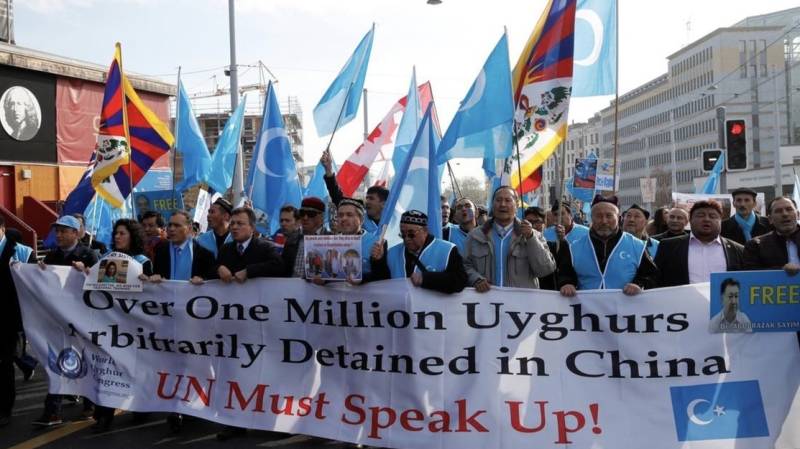US takes action against senior Chinese officials over Uighur rights

Stay tuned with 24 News HD Android App

The United States on Thursday took its first major action to stop "horrific" abuses against China's Uighurs and other Turkic Muslims, slapping sanctions on several senior officials.
Three officials will be refused US visas and see any US-based assets frozen including Chen Quanguo, the Chinese Communist Party chief for the Xinjiang region and architect of Beijing's hardline policies against restive minorities.
Secretary of State Mike Pompeo said the United States was acting against "horrific and systematic abuses" in the western region including forced labour, mass detention and involuntary population control.
"The United States will not stand idly by as the CCP carries out human rights abuses targeting Uighurs, ethnic Kazakhs and members of other minority groups in Xinjiang," Pompeo said in a statement.
The other two officials hit with the full sanctions were Wang Mingshan, the director of the Xinjiang Public Security Bureau, and Zhu Hailun, a former senior Communist leader in the region.
The Treasury Department sanctions also make it a crime in the United States to conduct financial transactions with the three people as well as a fourth person, former security official Huo Liujun, who was not subjected to the separate visa restrictions.
The Treasury Department also imposed sanctions on the security bureau as an institution, pointing to its sweeping digital surveillance of Uighurs and other minorities.
'At last, real consequences'
Witnesses and human rights groups say that China has rounded up more than one million Uighurs and other Turkic Muslims in Xinjiang in a vast brainwashing campaign aimed at forcibly homogenizing minorities into the country's Han majority.
Pompeo in a conference call with reporters Thursday called the situation "the stain of the century" and has previously drawn parallels with the Holocaust.
China counters that it is providing education and vocational training in a bid to reduce the allure of Islamic radicalism, a threat it says it shares with the United States.
The Uighur Human Rights Project, an advocacy group, hailed the sanctions and urged other countries to follow suit.
"At last, real consequences have begun. This comes at the 11th hour for Uighurs," said the group's executive director, Omer Kanat.
The action comes amid soaring tension between the United States and China on a range of issues from trade to defense to the coronavirus pandemic.
Pompeo in recent weeks has also announced visa restrictions on Chinese officials over the treatment of Tibet and Beijing's clampdown in Hong Kong -- but, in contrast, did not publicly name anyone affected.
'A ripple effect'?
Olivia Enos, a senior policy analyst at the conservative Heritage Foundation who studies human rights, doubted that Beijing would suddenly reverse course in Xinjiang.
But she voiced hope that the sanctions would have a broader impact and said it was especially noteworthy that the United States targeted Chen, who before Xinjiang made his name through strong-armed tactics in Tibet.
"My guess is that this will have a ripple effect throughout the Chinese Communist Party. Other would-be bad actors may think twice before engaging in behaviors like you see Chen Quanguo carrying out," she said.
"It is important to remember that Treasury has authority over all dollar-dominated currency transactions," she said. "So it is significant."
The visa ban impacts officials' immediate families, depriving their children of the prestige of jetsetting across the Pacific for education or pleasure.
Congress has led the push for a tougher response on Xinjiang and in May passed an act that authorized sanctions, listing Chen by name, although Pompeo and Treasury Secretary Steven Mnuchin took Thursday's actions under separate authorities.
In a fresh effort, 78 members of Congress across party lines released a letter that urged President Donald Trump's administration to consider formally designating China's policies as genocide.
Despite wide concern in Washington over treatment of the Uighurs, former national security advisor John Bolton in an explosive new book said he was shocked at Trump's attitude on the issue.
Bolton wrote that Chinese President Xi Jinping explained his policies to Trump in a meeting and that the US leader, eager for a trade deal with Beijing, replied that the detention camps were "exactly the right thing to do."
